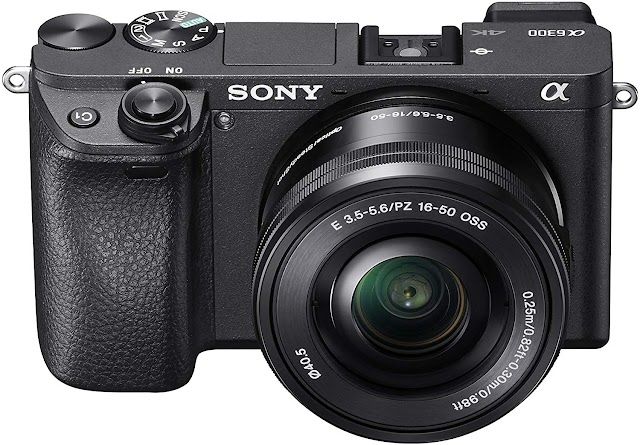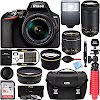A few months ago, Sony released the A7 III which is the third generation of full-frame mirrorless cameras. Sony A7 Mark III is the successor of the previous generation Sony A7 Mark II. This high resolution mirrorless camera is designed for professional photographers. The camera is equipped with a 24-megapixel full-frame sensor and good 4k video capture capability in full-frame or croped APSC mode.
Features that are not only that, built-in stabilization is also available, 10fps continuous shooting with autofocus and the longest battery life ever seen from a mirrorless camera to date. No wonder the price of the Sony A7 III camera is priced at 27 million. The successor of the Sony A7 Mark II is expected to be the best mirrorless camera that can win the hearts of professional photographers.
As the latest generation, the A7 Mark III is equipped with a 24.2 megapixel Exmor R ™ CMOS sensor equipped with a rear luminous structure. The sensor is combined with the latest BIONZ X ™ image processing engine and LSI front-end. This combination results in 2x data reading speed and 1.8x higher data processing capability.
For smoother and more natural gradations, the BIONZ X and LSI front-end image processors process 16-bit image signals. 14-bit RAW data output can also be generated, even in still or continuous shooting mode. The range of ISO standards has also been increased up to ISO 100-51200 which can be extended up to ISO 50-2048006.
To complete the Sony A7 III specifications, Area Specific Detail Reproduction and Noise Reduction technology is also installed to maintain image details and trim noise. This makes the camera have a dynamic range of about 15 stops7 at low sensitivity settings. A slick combination of features, making the Sony A7 III photos have a smooth gradation from shadow to spotlight.
AF performance has also been improved by enhancing AF as on the A9 and applying it optimally. For this reason, the camera is integrated with a phase detection AF system for great speed and tracking, plus high-precision contrast detection AF, Sony's Fast Hybrid AF can capture images of moving subjects very sharply and quickly.
AF speed performance has doubled. The camera has 693 phase detection AF points covering about 93% of the image area 425 contrast detection AF points that are positioned tightly to improve focus. The legacy performance of the legacy Sony A9, produces AF tracking with increased precision for continuous shooting at fast action.
The AF system will also still work even at light levels as low as -3EV. No wonder the results of Sony A7 III shots have clear and sharp colors. Faster image sensor readings, the camera is able to track various movements and predict with high precision so that important moments can be captured.
With this new AF system, A7 III can take continuous pictures up to 10 fps with AF / AE tracking and 8 fps when in direct display mode. Interestingly, the camera is also capable of taking pictures up to 177 JPEG images (standard), 172 JPEG Fine, 163 Extra Fine JPEG, 89 RAW compression, or 40 non-compressed RAW that can be taken in one continuous burst using a mechanical shutter.
The camera is also equipped with 5-axis stabilization in-body stabilization that works with almost all lenses. The latest high-precision stabilization system uses a stabilization unit and a gyro sensor as well as an algorithm to achieve a 5.0-step shutter speed advantage which is useful for keeping shots more stable.
Sony also added their Eye AF feature to the A7 III, which works even in AF-C mode. Eye AF is a very useful feature that allows you to lock and track subjects' eyes as they move and even through obstructions.
Do not forget also the ability to record 4K UHD video also exists on this good camera. Based on the Sony Alpha A7 III review, the camera is able to record 4K movie videos (QFHD: 3840 x 2160) internally. The camera uses full 6K pixel readout for super high quality recordings.
A7 III also supports HLG (Hybrid Log-Gamma) image profiles, which support Instant HDR workflows, enabling HDR compatible TVs (HLG) to play 4K HDR images. S-Log2 and S-Log3 modes are available to increase color gradation flexibility, as well as Zebra functions, Gamma Display assistance and proxy recording.
The camera can also record Full HD at 120 fps to 100 Mbps in the XAVC S format. This allows the recording to be reviewed and finally edited to 4x or 5x slow motion video files in Full HD resolution with AF tracking.
Speaking of EVF, the A7 III features a high resolution and high contrast XGA OLED Tru-Finder with 2.3 million dots complete with Zeiss T. coating. Standard or High display quality settings are available for the viewfinder and monitor as well. EVF Mark III also feels bigger than Mark II, with an enlargement of 0.78x versus 0.71x.
This time, Sony equipped the A7 III with a 922K type TFT LCD screen which is touch sensitive. The screen allows you to adjust the focus point and browse images quickly. This LCD can be tilted up to a maximum of 107 ° and down to a maximum of 41 °. With this new feature, it will facilitate flexibility and comfort in holding cameras and shooting monitoring.
Sony's latest full-frame camera is also equipped with various capabilities that have been upgraded. Like a dual media card slot, with support in one slot for UHS-II type SD memory cards. You also have various options for storing content on each card, including separate JPEG / RAW recording, separate image / movie recording, relay recording, and more.
A7 III is also able to transfer files to smartphones, tablets, computers or FTP servers via Wi-Fi and now includes Bluetooth. The camera also offers a USB Type-C SuperSpeed USB (USB 3.1 Gen 1) terminal for increased flexibility in the power supply and faster image transfer speeds during shooting.
For durability, Sony equip A7 III with NP-FZ100 batteries with a capacity of around 2.2x compared to NP-FW50 batteries. From the results of CIPA, the ability of the battery is amazing, because it can last up to 710 photos percharge. This battery is the longest battery life in the world from a mirrorless camera without a battery grip. The optional BC-QZ1 battery charger charges faster than via USB.
With this A7 III, Sony has succeeded in creating the best camera on a full-frame model. With the new sensor, twice the shooting speed, fast autofocus and increased battery life, Sony hopes professional photographers are interested in upgrading its mirrorless camera.
 |
| Sony A7 III Photoshoot |
 |
| Sony A7 III Photoshoot |
Seeing a lot of improvements made, of course prices are also rising. As the best mirrorless camera, this camera is priced at 27.4 million for the price of the Sony A7 III body only. As for the price of the Sony A7 III Kit E 28-70 mm f / 3.5-5.6 OSS is priced at 30.2 million.
With the existence of the A7 III, it will become a tight competitor in its class because it offers more attractive specifications and features than its competitors in the same price bracket.
Full Specifications of ......
| General | |
|---|---|
| Brand | Sony |
| Model | Sony Alpha A7 III |
| Announced | 2018-02-27 |
| Body Type | SLR-style mirrorless |
| Lens | |
| Manual Focus | |
| Lens Mount | Sony E |
| Number of Lenses | 115 |
| Focal Length Multiplier | 1x |
| Macro Focus Range | n/a |
| Screen | |
| Screen Type | Tilting |
| Screen Size | 3 |
| Screen Resolution | 922k dots |
| Live View | |
| Touch Screen | |
| Viewfinder | |
| Viewfinder | Electronic |
| Viewfinder Resolution | 2,359k dots |
| Viewfinder Coverage | 100% |
| Viewfinder Magnification | 0.78 |
| Photography Features | |
| Min Shutter Speed | 30s |
| Max Shutter Speed | 1/8000s |
| Continuous Shooting | 10.0 fps |
| Shutter Priority | |
| Aperture Priority | |
| Manual Exposure Mode | |
| Exposure Compensation | Yes |
| Custom White Balance | |
| Image Stabilization | |
| Built-in Flash | |
| Flash Range | no built-in flash |
| Flash Modes | no built-in flash |
| External Flash | |
| AE Bracketing | |
| WB Bracketing | |
| Exposure Modes | |
| Multi-Segment | |
| Average | |
| Spot | |
| Partial | |
| AF-Area | |
| Center Weighted | |
| DxO Sensor Scores | |
| DxO Overall Score | 96 |
| DxO Color Depth | 25.0 |
| DxO Dynamic Range | 14.7 |
| DxO Low Light ISO | 3730 |
| Sensor | |
|---|---|
| Sensor Type | BSI-CMOS |
| Sensor Size | Full frame |
| Sensor Dimensions | 35.8 x 23.8 mm |
| Sensor Area | 852.04mm2 |
| Sensor Resolution | 24 megapixels |
| Max Image Resolution | 6000 x 4000 |
| Max Native ISO | 51,200 |
| Max Boosted ISO | 204800 |
| Min Native ISO | 100 |
| Min Boosted ISO | 50 |
| RAW Support | |
| Autofocus | |
| AF Touch | |
| AF Continuous | |
| AF Single | |
| AF Tracking | |
| AF Selective | |
| AF Center | |
| AF Multi Area | |
| AF Live View | |
| AF Face Detection | |
| AF Contrast Detection | |
| AF Phase Detection | |
| Number of Focus Points | 693 |
| Number of Cross Focus Points | Unknown |
| Video Features | |
| Video Resolutions | 3840 x 2160 (30p, 24p) 1920 x 1080 (120p, 60p, 60i, 24p), 1440 x 1080 (30p), 640 x 480 (30p) |
| Max Video Resolution | 3840 x 2160 |
| Video Formats | MPEG-4, AVCHD, XAVC S, H.264 |
| Microphone Port | |
| Headphone Port | |
| Connectivity | |
| Wireless Connectivity | Built-In |
| HDMI | |
| USB | USB 3.1 Gen 1 (5 GBit/sec) |
| Physical | |
| Environmental Sealing | |
| Water Proof | |
| Dust Proof | |
| Shock Proof | |
| Crush Proof | |
| Freeze Proof | |
| Weight | 650g |
| Physical Dimensions | 127 x 96 x 74mm |
| Battery Life | 610 shots |
| Battery Type | Battery Pack |
| Battery Model | NP-FZ100 |
| Other Features | |
| Self Timer | Yes (2 or 10 sec; continuous (3 or 5 exposures)) |
| Timelapse Recording | |
| GPS | None |
| Storage Type | SD/SDHC/SDXC, Memory Stick Duo/Pro Duo/Pro-HG Duo |
| Storage Slots | 2 |





0 Comments